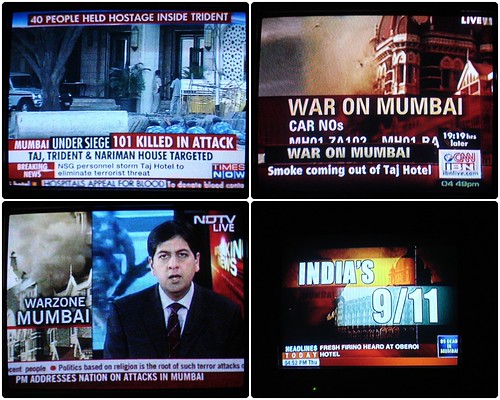There is still isolated fighting in Mumbai. Headline drama has come from the storming of a Jewish cultural centre by Indian commandos, while The Times of India reports that there is still firing at the old section of the Taj Hotel, with at least one assailant possibly holding two more hostages.
The immediate conflict, however, is over, leaving at least 125 dead. Amidst the tragedy and rather empty blustering from British papers of standing side-by-side with India, the question inevitably turns into, "Who and why?"
Almost everything I have read is uncertain speculation. The initial easy response of "Al Qa'eda" has been joined by consideration of Pakistani groups, either supported by factions of the Government or independent of it. The latest wave of possibility, based on reports that some of the assailants spoke Hindi, is
that this might be an Indian militant group.
We don't know. And I don't think that the intelligence services --- in India, in Pakistan (unless they indeed are linked to the assailants), in Britain, in the US --- know. All of this pondering is understandable, but at this point it just heightens fear without any sense of resolution.
It would be so much easier if Al Qa'eda had claimed responsibility, as in
Michael Evans' masterpiece of irrelevance in The Times --- based on casual chat with "British intelligence sources" --- that Al Qa'eda "might be plotting an attack 'to grab the headlines' before Mr Obama takes over in the White House on January 20". This would have given us the best villain while absolving others (e.g. Pakistani authorities) and ignoring the complexities raised by yet others (Pakistani groups who are not part of Al Qa'eda's master plan).
A media incident this morning illustrates the point too painfully. BBC Radio 4's flagship programme
Today has just wet itself with panic after the former head of India's intelligence services none-too-subtly suggested that the attackers are supported by the Pakistani intelligence services and military, acting independently or in defiance of the Zardari Government.
The host immediately went to the BBC's security correspondent to throw cold water on this. Gorden Corera assured everyone that the British Government's counsel was not to rush to judgement. Understandable, I think, given that Foreign Secretary David Miliband was just in Islamabad and proclaiming total confidence in his ally Prime Minister Zardari.
We do not know. But if anyone wants something for consideration, here goes:
Just as the instability in Pakistan feeds from and contributes to the ongoing instability in Afghanistan, so it may be the case that instability in Pakistan --- a central Government which is far from strong, which is being undermined by the situation in the Northwest Frontier, and which now be fragmented --- is contributing to the dramatic instability of the last 48 hours.
Whether that continues is, for me, the important issue. And it is far more important than the inconvenience, offered in
the analysis offered by The New York Times this morning, that it "will make the agenda of the new American administration harder".
 Friday, November 28, 2008 at 18:50
Friday, November 28, 2008 at 18:50  Mumbai,
Mumbai,  Mumbai attacks,
Mumbai attacks,  Terrorism,
Terrorism,  War On Terror,
War On Terror,  security in
security in  War On Terror
War On Terror 
